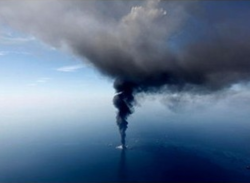Latest oil rig explosion in the Gulf renews calls for regulatory action
 The Gulf Coast is breathing a collective sigh of relief today in the wake of yesterday's explosion and fire at an oil and gas production rig 100 miles off the Louisiana coast -- an incident that initially sparked fears that the environmental and economic crisis afflicting the region in the wake of the BP disaster was about to get worse.
The Gulf Coast is breathing a collective sigh of relief today in the wake of yesterday's explosion and fire at an oil and gas production rig 100 miles off the Louisiana coast -- an incident that initially sparked fears that the environmental and economic crisis afflicting the region in the wake of the BP disaster was about to get worse.Fortunately, none of the 13 workers aboard Mariner Energy's rig was seriously injured, the fire (pictured at right) has been extinguished, and early reports of a mile-long oil sheen from the site turned out to be wrong, the Coast Guard reports. The cause of the incident remains under investigation.
Because it was a production platform rather than a drilling rig and was working at the relatively shallow depth of 340 feet, the Mariner operation was not affected by the deepwater drilling moratorium imposed by President Obama to address safety concerns. But the incident has intensified the controversy over stricter regulation of the offshore oil and gas industry.
The day before the explosion on the Mariner rig, an employee with the company -- which in recent years has dramatically increased its deepwater operations -- accused the Obama administration of "trying to break us" with the drilling moratorium, the Financial Times reports. She made the remark at one of the Texas rallies against the moratorium organized by the American Petroleum Institute.
But environmental advocates see the incident as further evidence that regulators need to take a closer look at how the industry is overseen -- regardless of whether the operations are in deep or shallow water.
A 2007 report by the Minerals Management Service found that most well blowouts occur at wells in water depths of less than 500 feet. The Mariner rig was operating in 340 feet of water. The largest oil spill in the Gulf of Mexico prior to this year's BP catastrophe was the 1979 Ixtoc 1 disaster that occurred in just 160 feet of water, while Australia's recent Montara disaster occurred at 250 feet.
"Rather than lifting the moratorium on deepwater drilling, the Obama administration needs to step in now and expand it to any new drilling in shallow waters," says Peter Galvin, conservation director for the nonprofit Center for Biological Diversity. "Offshore drilling is an inherently unsafe, toxic activity that, every day, puts people and the environment at risk."
Indeed, federal authorities have cited Houston-based Mariner -- a former Enron subsidiary whose planned purchase by Apache Corp. has been called into question since the accident -- and related entities for 10 accidents in the Gulf of Mexico over the past four years, according to an Associated Press review of safety records from the federal Bureau of Ocean Energy Management, Regulation and Enforcement:
The accidents range from platform fires to pollution spills and a blowout, according to accident-investigation reports from the agency formerly known as the Minerals Management Service.In late July, the House passed a bill in response to the oil spill that was hailed by environmental advocates for addressing a dysfunctional oversight system -- but the Senate failed to take it up before August recess because some members objected to making oil companies liable for the full cost of spill. Environmental advocates are calling for lawmakers to take action now.
In 2007, welding sparks falling onto an oil storage tank caused a flash fire that slightly burned a contract worker. The Minerals Management Service issued a $35,000 fine.
"How many offshore oil disasters will we watch before our Senate does something about this dangerous industry and our government's oversight of it?" asks Liz Judge of the nonprofit law firm Earthjustice. " How many explosions until the public and our leaders embrace policy that ramps up safety measures and protects our coastlines?"
(U.S. Coast Guard photo of Mariner rig file from AP via SkyTruth.)
Tags
Sue Sturgis
Sue is the former editorial director of Facing South and the Institute for Southern Studies.
